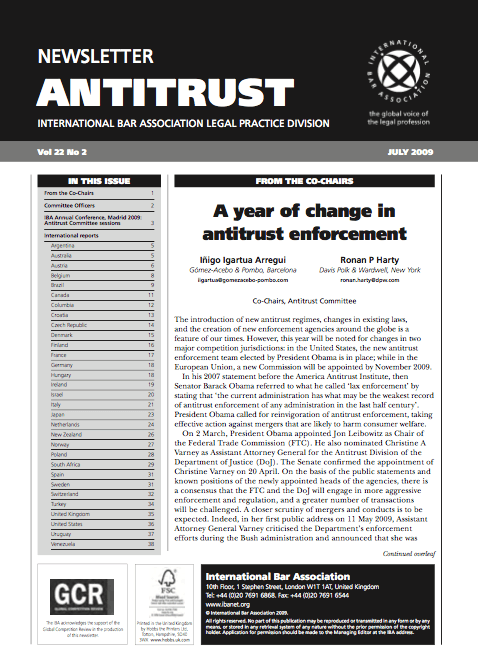Colombia introduce nuevas reglas para castigar la Intermediación laboral ilegal
María Camila Castiblanco, Peña Mancero Abogados
Mediante Resolución 2021 del 29 de mayo de 2018, el Ministerio del Trabajo de Colombia, estableció los lineamientos de la Administración para determinar las prácticas de intermediación laboral ilegal, mediante las cooperativas o pre-cooperativas de trabajo, contrato sindical, empresas asociativas de trabajo y contratistas independientes.
El Ministerio señala que las Direcciones Territoriales deberán analizar la contratación con terceros, y cuando se trate de contratistas independientes para el desarrollo de actividades misionales, analizará, entre otras cosas:
- Si el contratista hace las mismas o sustancialmente las mismas labores que realizan los trabajadores del contratante y a qué tipo de labores corresponden dentro de las actividades propias del contratante;
- Si los trabajadores actuales del contratista han sido trabajadores del contratante o de cualquier otro contratista que este último haya tenido;
- Si el contratista tiene autonomía en el uso de los medios de producción en la ejecución de los procesos o subprocesos que se contraten;
- Si el contratista ejerce frente a sus trabajadores la potestad reglamentaria y disciplinaria, o, por el contrario, si la misma la ejerce el contratante;
- Si el contratista y el contratante incurren en conductas violatorias de los principios y normas laborales vigentes en la celebración o ejecución de la figura que los une.
De esta manera, la Resolución limita la intermediación laboral a:
- El envío de trabajadores en misión para colaborar de manera temporal a empresas en el desarrollo de sus actividades, conforme lo establece el artículo 71 de la Ley 50 de 1990 y el Decreto 4369 de 2006. Por lo tanto, esta actividad no está permitida a ninguna persona natural o jurídica que no esté debidamente acreditada como empresa de servicios temporales mediante la autorización emitida por el Ministerio del Trabajo; y
- El servicio de intermediación en la gestión y colocación contenida en el Servicio Público de Empleo, en donde las empresas que adelantan este servicio deben cumplir con las normas legales y reglamentarias sobre la materia.
La anterior Resolución implica una mayor regulación frente a la intermediación laboral, toda vez que por primera vez, el Ministerio de manera clara establece cuáles son los indicios que se deberán tener en cuenta para determinar si se está en un caso de intermediación laboral, parámetros que resultan clave tanto para las entidades administrativas como para los jueces laborales para identificar estas situaciones, y en efecto, una mayor potestad sancionatoria por parte de las entidades administrativas y de declaraciones de contratos realidad por parte de los jueces laborales.
Así mismo, mediante esta nueva Resolución se limita el campo de la intermediación laboral, de tal manera que se limita la intermediación laboral a dos (2) escenarios: por medio de las Empresas de Servicios Temporales, debidamente autorizadas por el Ministerio del Trabajo y en los casos que permite la Ley, en los casos permitidos por la misma, y la que se realiza con ocasión al Servicio Público de Empleo, razón por la cual las empresas al no contratar el personal de manera directa, deberán tener en cuenta los parámetros establecidos en esta Resolución para así evitar una intermediación laboral ilegal.
La anterior Resolución implica el riesgo para las empresas que deciden tercerizar sus actividades misionales permanentes, entendidas estas como “aquellas actividades o funciones directamente relacionadas con la producción de bien o servicios característicos de la empresa” (artículo 1, Decreto 2025 de 2011), de si esta intermediación es realizada por medio de una Empresa de Servicios Temporales, se deberá verificar que la tercerización sea efectivamente autónoma y no se trate de una tercerización aparente, y que ésta no se esté tratando de ocultar y/o afectar el acceso al empleo y el derecho al trabajo, los derechos constitucionales, legales y prestacionales consagrados en las normas laborales vigentes, so pena de incurrir en multas de hasta 5.000 salarios mínimos legales mensuales vigentes.
Adicional a la sanción administrativa, en el caso de una eventual demanda por parte del contratista en donde pretenda reclamar la existencia de un vínculo laboral con la empresa contratante, el hecho de que se haya declarado la intermediación laboral ilegal, constituirá un indicio grave en contra de declaratoria de contrato realidad.

Newsletter february 2025
Superior Tribunal of Medellín – Civil Chamber – Judgment on Interruption of the Statute of Limitations for Contractual Liability Actions
By means of a judgment dated July 16, 2024, the Civil Chamber of the Superior Tribunal of Medellín ruled that the statute of limitations for an action derived from a transportation contract is two (2) years and may be suspended by the filing of a request for extrajudicial conciliation, thereby extending the period until its conclusion.
The plaintiff sought to hold the defendants contractually, extra-contractually, and jointly liable for the damages suffered as a passenger in a traffic accident involving the vehicle. In response, the defendants raised the defense of extinctive prescription, arguing that the lawsuit was filed more than two (2) years after the transportation obligation should have concluded (August 17, 2016).
Article 993 of the Commercial Code provides that “Direct or indirect actions arising from a transportation contract are subject to a statute of limitations of two years. The limitation period shall begin to run from the day on which the transportation obligation has concluded or should have concluded. This term cannot be modified by the parties.”
The plaintiff contended that the filing of the request for a conciliation hearing, considering the suspension period agreed upon by the parties, effectively interrupted the statute of limitations set forth in Article 993 of the Commercial Code.
The judge concluded that, although Article 993 of the Commercial Code establishes a two (2) year limitation period, which would have run from August 17, 2016, to August 17, 2018, the plaintiff’s request for a conciliation hearing on August 17, 2018, in conjunction with Article 21 of Law 640 of 2001, led to the suspension of the statute of limitations on the last day available to initiate the action. Consequently, an additional three (3) months, corresponding to the conciliation hearing period, must be added.
Furthermore, the judge explained that the suspension of the limitation period includes any extensions to the conciliation hearing agreed upon by both parties, as (i) they were mutually agreed upon, and (ii) the request was filed before the expiration of the initial three-month period within which the hearing should have taken place, extending until November 17, 2018. Therefore, the judge did not uphold the defense of extinctive prescription.
Decree 34 of 2025 – Amendment to Decree 2555 of 2010 Regarding Crowdfunding Activities
In line with productive transformation strategies, it is essential to strengthen access to financing, particularly to facilitate the growth of micro, small, and medium-sized enterprises (MSMEs), promote the adoption of advanced technologies, diversify financing alternatives for working capital, strengthen the integration of production chains, and develop workforce capabilities.
Among alternative financing mechanisms, crowdfunding platforms stand out for their ability to finance productive projects. Accordingly, it was deemed appropriate to modify their regulatory framework to expand access to financing across various economic sectors.
Key modifications include:
- The inclusion of individuals with productive projects as eligible crowdfunding recipients.
- Authorization for entities engaged in crowdfunding to develop new services that facilitate compliance with formal requirements by potential recipients.
- Strengthening information mechanisms for contributors.
- Allowing collective investment vehicles to participate in crowdfunding activities.
Key provisions of the Decree include:
- Individuals may receive crowdfunding for their productive projects through a newly created specific modality: “Crowdfunding through debt-representative securities issued by individuals.”
- As an investor protection measure, a maximum amount of 14,245.27 Basic Value Units (UVB), equivalent to COP 164,561,359.04, is set for this modality. Additionally, recipients who obtain financing under this modality may only have one funded project at a time.
- Crowdfunding entities may offer new services, including: (i) Collection and advertising services; (ii) Administration of transaction record-keeping systems for crowdfunding securities; (iii) Technical support services to potential recipients in structuring productive projects, among others.
- Crowdfunding entities must adopt a classification procedure for productive projects based on an objective analysis of the information provided by the recipients. Objective variables such as income, assets, and credit history must be available on a publicly accessible section of the crowdfunding entity’s website.
- Autonomous trusts, collective investment funds, and private equity funds may participate as contributors and recipients in crowdfunding projects.
Resolution No. 000004 of 2025 – DIAN – Prescription of Form 115 for Income Tax and Supplementary Returns for Taxpayers with Significant Economic Presence (PES) in Colombia
Pursuant to Article 20-3 of the Tax Statute, non-resident individuals or entities without a domicile in Colombia but with significant economic presence (PES) in the country are subject to income tax and supplementary obligations on income derived from the sale of goods and/or the provision of services to customers and/or users located in Colombian territory.
Those meeting the criteria set forth in this article must choose between: (i) Filing and paying income tax and supplementary obligations through the prescribed form, or(ii) Paying the tax through withholding at the source under the income tax and supplementary obligations regime for significant economic presence (PES) in Colombia.
Accordingly, this resolution prescribes the form for taxpayers opting to file an income tax return. These taxpayers must register in the Single Tax Registry (RUT) under responsibility code 65. The return must be filed through electronic services using an Electronic Signature (FE) authorized by the Special Administrative Unit of the National Tax and Customs Directorate (DIAN).
Superior Tribunal of Bogotá – Civil Decision Chamber – Judgment on Financial Habeas Data
The plaintiff sought a declaration of the existence of a basic public switched telephone service (TPBC) contract entered into with the defendant, which was in force from March 14, 2007, until April 27, 2009. The plaintiff alleged that the defendant company abused its dominant position by imposing charges exceeding the agreed fixed rate and reporting her as a delinquent debtor to credit bureaus Datacrédito and Cifin from April 2008 to May 8, 2009. Consequently, the plaintiff sought damages for both pecuniary and non-pecuniary harm.
The judge first determined that, although the plaintiff invoked the regime of extra-contractual liability, based on the facts of the case, the rules of contractual liability were applicable. The Supreme Court of Justice, Civil Cassation Chamber (SC-3653-2019), has clarified that liability in financial habeas data cases arises from the collection, processing, and dissemination of debtor information within the contractual relationship—in this case, a telecommunications service contract. Specifically, the claim was based on the improper use of the debtor’s authorization granted to the company, requiring truthful, accurate, and diligent reporting to credit bureaus. The erroneous reports were attributable to the defendant’s billing mistakes, rather than the plaintiff’s non-compliance with obligations.
In accordance with ruling SC10297 of 2014 from the Supreme Court of Justice, Civil Cassation Chamber, the judge recognized damage to María Judith Castillo Hernández’s reputation as an independent and distinct harm, acknowledged by case law since that year. Since this type of damage was not foreseeable when the plaintiff filed the claim (October 3, 2011), the court ruled that the claim could be redirected to specifically address this reputational harm. The court awarded damages of COP 15,000,000 based on judicial discretion (arbitrium judicis).

Labor Reform Approved in Second Debate in the House of Representatives
The House of Representatives approved the labor reform bill presented by the National Government with 93 votes in favor and 13 against. The approved bill contains 81 articles, including provisions for increasing remuneration on mandatory rest days from 75% to 100%, to be phased in by 2027; formalizing employment for community mothers; establishing employment contracts for SENA students; and providing paid leave for medical appointments, school commitments, union commissions, or domestic emergencies, and extending paternity leave to up to 4 weeks.
Articles removed include parental leave for same sex adopting couples, increased compensation for dismissal without just cause, and the agricultural contract.
Eight articles were added addressing formalization and employment for cargo and passenger transportation workers, programs for first and last employment, promotion of sustainable work, flexible work environments, among others.
The bill will now proceed to the Seventh Senate Committee for the final two debates.

Resolution No. 532 of 2024 UGPP: Establishing a Cost Assumption Scheme for Self-employed Workers and Those Who Enter Contracts
Recently, the Special Administrative Unit of Pension Management and Social Security Contributions (“UGPP” by its initials in Spanish) issued Resolution 532 of 2024, establishing a cost assumption scheme for self-employed workers and those who enter contracts other than personal service provision contracts, involving subcontracting and/or the purchase of supplies or expenses, based on the economic activities listed in the International Standard Industrial Classification (CIIU). This scheme also applies to cases where the economic activity is public motor freight transport by road, as a method to establish the base contribution income (IBC).
To apply the presumed cost coefficient, the obligated party must refer to the section of economic activities generating their monthly gross income during the period they received it and apply the corresponding cost percentage.
If the income comes from multiple economic activities, the corresponding cost percentage for each activity must be applied.
Specifically, for the public motor freight transport sector by road, a general cost presumption scheme was defined for self-employed workers and for employers who have verified social security contributions for the drivers they have employed. They can deduct the cost percentage established in the resolution, based on the range of gross income and the number of drivers.
As an exception, a different cost percentage can be set, provided supporting documents are available and requirements established in Article 107 of the Tax Code are met without exceeding the values included in the income tax return.
This resolution will apply from November 1, 2024.

Ministry of Labor Proposes Regulations for Reporting Major Incidents or Accidents in Classified Facilities
The Ministry of Labor has published a draft resolution to regulate procedures for reporting major incidents and accidents in classified facilities, aligning with international industrial safety standards to promote a safer and more responsible work environment.
The draft specifies that the person responsible for the facility must report any major incident or accident within two hours of occurrence, using the Ministry’s designated digital tool.
The resolution also defines criteria for classifying an event as a major incident, including severe injuries, fatalities, property damage, and significant chemical containment losses.
The responsible party must expand the report as the emergency response concludes and calculate annual process safety metrics, reporting them through the same digital tool.

New rules on paternity leave introduced in Colombia
Author: Daniel Salazar López
The Colombian Congress has passed Act 2141 (August 10, 2021) whereby a further protection has been granted to parents. Act 2141 incorporates several new provisions on labor matters and, in particular, on maternity and paternity privileges. The following are the most important aspects of the new law:
- Maternity leave was extended from three (3) months to eighteen (18) weeks after childbirth.
- Unless an authorization is obtained from the Labor Inspector, or the Municipal Mayor in the corresponding case, the dismissal of a worker, whose spouse, partner or permanent partner is pregnant or within eighteen (18) weeks after childbirth and is not formally employed, is prohibited. If dismissal occurs, the dismissed employee shall be entitled to the additional payment of an indemnity equivalent to sixty (60) days of salary.
- In addition, the indemnities and benefits that correspond by virtue of the employment contract shall be recognized.
- Paternity leave is not extended to the worker when his/her spouse, partner or permanent partner is in stable employment.
- Maternity leave is also extended to the parents in the same proportion during the 18 weeks following childbirth.
- The worker must notify the employer, verbally or in writing, of the pregnancy status of his/her spouse, partner or permanent partner and declare under oath that he/she does not have a stable job or that he/she is not a beneficiary of the Social Security Health System. Within the notification, the worker must present the necessary examinations and for this purpose she will have a term of up to one (1) month to prove the pregnancy status.
This new legislation is intended to protect the constitutional right to equality between men and women in the work environment and in harmony with the family environment.

Regulatory Convergence in the Digital Era: The Impact of the U.S. GENIUS Act on Stablecoins and Colombia’s Decree 1069 on Low-Value Payment Systems
CAUSE FOR DISOLUTION OF COMPANIES DUE TO NON-COMPLIANCE WITH THE HYPOTHESIS OF CONTINUING BUSINESS





